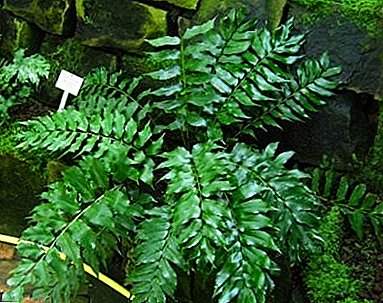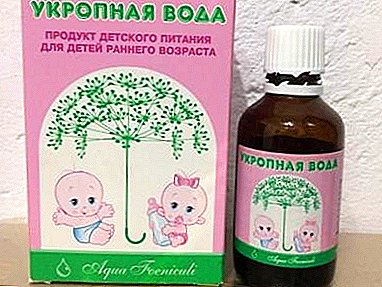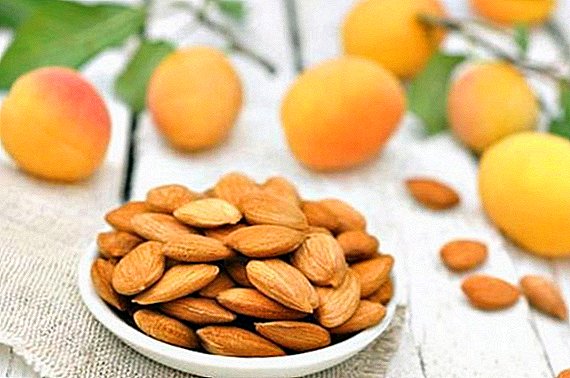 Eating apricots, we, without thinking, throwing seeds, and in fact we do it in vain - in terms of the usefulness of the core of apricots are not inferior to many products that are more familiar to us. They are used in cooking, traditional medicine, cosmetology, as we will tell you more.
Eating apricots, we, without thinking, throwing seeds, and in fact we do it in vain - in terms of the usefulness of the core of apricots are not inferior to many products that are more familiar to us. They are used in cooking, traditional medicine, cosmetology, as we will tell you more.
Nutritional value: substance content
About 100% of the daily requirement for proteins (25g), more than half of the daily requirement for fats (45g), and also about 3g of carbohydrates, 5g of water and 2.5g of ash are in 100 g of kernels from apricot kernels.
Essential amino acids in the nucleus of ossicles are as follows:
- arginine;
- leucine;
- phenylalanine;
- valine;
- isoleucine;
- lysine;
- threonine;
- histidine;
- tryptophan;
- methionine.
Important! Apricot pith core contains the toxic substance amygdalin, which in large quantities can lead to severe poisoning.

Replaceable amino acids in apricot kernels are also available:
- glutamic acid;
- tyrosine
- aspartic acid;
- proline;
- glycine;
- cysteine;
- alanine;
- serine.
Familiarize yourself with the beneficial properties of grape seed.The pith core is rich in fatty acids:
- omega-6;
- omega-9;
- linoleic and others.

Minerals in the composition of the nucleoli:
- potassium;
- phosphorus (more than half the daily norm);
- magnesium;
- calcium;
- sodium;
- iron.
Of the vitamins in the bones contains the PP, which is responsible for the condition of the skin, nervous system, intestines.
Calorie content
Apricot kernels are a very high-calorie product, they contain 450-520 kcal per 100 g of product, which is a little less than a third of the daily requirement.
Did you know? In the 16th century in England, apricot kernel oil was valued as high as gold.

Use: medicinal properties
Apricot pits, according to traditional medicine, have such a beneficial effect on the body:
- antiparasitic;
- thin the mucus from the respiratory tract;
- have anti-inflammatory effects;
- help with kidney inflammation;
- well affect the skin;
- help the body fight tumors;
- improve brain function;
- clean the vessels;
- enhances intestinal contractility;
- speeds up the metabolism.
Did you know? In medicine of ancient China as far back as the 3rd millennium BC. they treated the bones of apricots.

Medical applications
Traditional medicine uses apricot kernel kernels to treat:
- ARI;
- bronchitis;
For the treatment of bronchitis in folk medicine also use aloe, ivy, fennel, Icelandic moss, propolis tincture, marsh ledum, bergamot, blue cyanosis, garlic, acacia honey.
- laryngitis;
- conjunctivitis;
- ARVI;
- kidney inflammation;
- worms infection;
- diseases of oncological nature.
To do this, use a tincture, oil, Urbech (thick mass of pounded kernels), raw kernels or medication. Diseases of colds are treated with tincture.
Important! Representatives of alternative medicine are actively promoting the drug based on the apricot kernel core for the treatment of cancer, but official medicine does not confirm this effectiveness.

Use in cosmetology
In cosmetology, oil and apricot kernel scrub are used for:
- carrying out massage;
- masking;
- cleansing and moisturizing the skin;
- peeling procedures;
- improve hair growth;
- making creams, lotions and shampoos.
Nasturtium, nettle, chives, carrots, white willow bark, burdock leaves, black cumin and clove oils are also used to improve hair growth.
Harvesting and storage of pits
It is necessary to harvest only the bones of ripe apricots, because the cores of the unripe fruits are tasteless, contain few useful substances and are poorly stored. You can store whole bones or extracted from them and peeled kernels. Mid-peeled films will taste better, and unpeeled ones will last longer.
To start the bones need to be dried. Dry them, spreading out in a dry place on paper in a single layer, in a special dryer for vegetables and fruits or in an oven at a low temperature.  For storage it is better to use a fabric or paper bag, so the cores will not get damp. You can take a glass or plastic container, but instead of a lid, use gauze or cloth. Store the product in a dark and dry place for no more than 12 months.
For storage it is better to use a fabric or paper bag, so the cores will not get damp. You can take a glass or plastic container, but instead of a lid, use gauze or cloth. Store the product in a dark and dry place for no more than 12 months.
How to take apricot pits
In order to feel the positive effect from eating apricot kernels, you need to follow these rules:
- If there is a need to get rid of worms, it is enough to eat 5 kernels of seeds a day, and the problem will be solved.
- If your goal is to fight cancer, then you need bitter kernels containing amygdalin, which is attributed to healing properties.
- Peeled, but not dried bones should be eaten within 3 months.
- Only the bones without food processing have healing properties (it is not worth frying and boiling).
- Eat them 1 time in the morning for 1 hour before meals.
- To improve the taste, you can mix them with honey.
- Daily portion of the cores is 10-15 pieces per day, depending on the weight of the person

Important! Do not eat more than 1 kernel of apricot kernels per 5 kg of weight per day.
How to clean the core of apricot stones
Folk way to split the shell - using the door: the bone is inserted into the slot where the door hinge is located, and pressed. You can also buy a special device for splitting nuts, use the back of a garlic press, a hammer or a rolling pin.
All these methods have one drawback - sometimes the core is crushed with a shell, it is difficult to separate it from the fragments, so there is no need to exert much effort.
Possible harm
Sweet apricot kernels are believed to have no harmful effects, and bitter ones contain a substance that forms hydrocyanic acid in the body, which prevents oxygen from entering the tissues.
Therefore, the use of bitter pits in large quantities can have irreversible effects on the brain. In this regard, there is a restriction on the eating of bones.  The need to seek medical help arises from the following symptoms:
The need to seek medical help arises from the following symptoms:
- nausea;
- blue skin;
- weakness;
- muscle pain;
- confusion
You can also damage the skin, if not finely grind the bones to scrub.
Contraindications
The use of apricot cores is contraindicated for people with:
- gastritis;
- liver disease;
- dysfunction of the thyroid gland;
- diabetes mellitus.

It is also better to refrain from them during pregnancy and breastfeeding and should not be given to their children.
The recipe for healing remedies
Apricot kernels can be prepared for external and internal use - tincture, urbech, oil and scrub.
Tincture
To prepare the tincture will need:
- apricot core - 100 g;
- Vodka - 1 bottle.
Wrap the cores in a towel and roll with a rolling pin to make a crumb. Pour this crumb into a glass or enamelled dish, pour a bottle of vodka, cover and leave for 3 weeks, then strain through gauze, pour into a bottle or jar and store in a refrigerator or storeroom for up to 3 years.
Video: cooking tincture on apricot kernels
Every evening, this tincture is rubbing the sore joints and tying them with a warm scarf.
Urbech (pasta)
Urbech is a Dagestan delicacy made from flax, pumpkin seeds, nuts, or apricot kernels, ground to a slurry. To cook it, you need:
- apricot seeds - 50 g;
- honey - 50 g;
- butter - 40 g
Grind the seeds to a pasty state in a blender. Add honey, butter, mix well. Store Urbech need in the refrigerator.
Per day take no more than 3 teaspoons of treats. You can spread it on bread, add it to porridge, dip fruit in it, make salad dressing. Urbech recovers well, helps with colds. 
Face oil
Apricot oil in industry is produced by pressing the cleaned bones, it will not be possible to prepare it at home, but you can buy it at a pharmacy and use face care products based on it:
- Mask for dry and fading skin. It is necessary to take 1 teaspoon of oil and 1 banana, ground in mush. The ingredients are mixed, apply on the skin for 20 minutes, rinse with warm water. The session should be held at least 2 times a week.
When caring for dry skin also use masks based on evening primrose, St. John's wort, amaranth thrown back, viburnum, sea buckthorn juice, black raspberry, Indian onions and portulac.
- Mask for normal skin. For cooking you will need 1 teaspoon of oil and 1 raw potato, grated on a fine grater. Mix the ingredients thoroughly, apply on the skin, rinse with warm water after 15 minutes. Repeat at least 2 times a week.
- Nourishing mask. Take 1 tsp of apricot seed oil and rice flour, add 1 tablespoon of cottage cheese, mix well. Apply to the skin twice a week for 15 minutes, then rinse thoroughly with warm water.

- Mask for tired skin. Prepare 1 teaspoon apricot oil, 1 drop of chamomile essential oil and patchouli, mix well. Apply with a cotton swab on the skin of the face, after 20 minutes, blot the residue with a paper napkin. Repeat 2 times a week.
- Mask for dry skin. Mix 1 teaspoon apricot oil, 0.5 teaspoon of castor oil, 5 drops of vitamin E oil. Apply 3 times a week for 20 minutes, blot the rest with a paper napkin.
- Wrinkle treatment. Mix 1 tsp apricot oil, avocado oil and jojoba, add 3 drops of essential oils of incense and rosewood. Apply on face daily before bedtime, while massaging the skin. Blot the remains with a napkin.
- Nourishing eye cream. Mix 1 teaspoon of olive and apricot oil, 0.5 teaspoon of rosehip oil, 1 drop of oil vitamins A and E. Apply a small amount of the product to the skin around the eyes every evening with your ring finger and gently rub massage with your fingertips. Try not to stretch the skin. Blot the excess with a napkin.

Oil-based products (for tired, dry skin, anti-wrinkle and for eyelids) can be stored for a long time in the refrigerator on the door in a tightly closed glass jar. Masks with the use of food products are not subject to storage, they must be used immediately after preparation.
Scrub
For the peeling procedure, you can prepare a scrub of apricot kernels. For it are necessary:
- dried apricot kernels - 8 pieces;
- Pounded apricot flesh - 3 tablespoons.
Grind seeds with a blender into flour, add apricot pulp, mix. Apply to the skin with massage movements for 10 minutes, then rinse with warm water.
We recommend to read about how to make a facial scrub based on celery, pine and nutmeg.

Depending on the skin type, you can add to the mass:
- For oily skin - 1 tbsp. l oatmeal, 3 tbsp. l milk and 1 tbsp. l honey
- For fading skin - 3 tbsp. l pounded papaya pulp.
- For dry skin - 1 teaspoon of cream and honey.
- For women from 50 years - 1 teaspoon of cream, honey, mashed avocado pulp, 2 drops of wheat germ oil and bergamot.
Scrub helps to remove dead skin particles and update it. Apricot flour can be stored in a glass jar in a dark dry place for up to 12 months, ready-made scrubs are not subject to storage.
Apricot kernels have long been known for their beneficial properties, and many simply like their taste. They are widely used in cosmetology, and in folk medicine, they are used in confectionery. Just do not forget to be careful when introducing them into your diet, and limit their consumption to a small amount per day.













